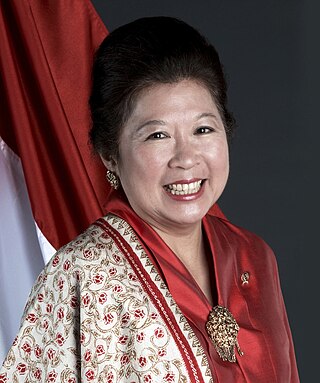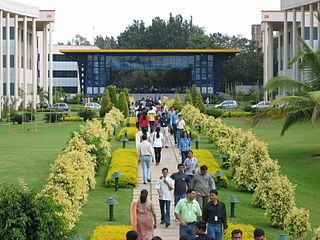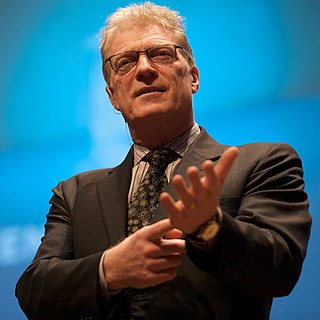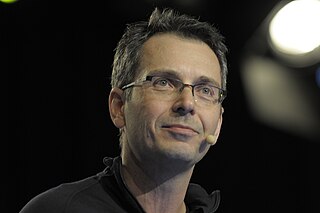Creative destruction is a concept in economics that describes a process in which new innovations replace and make obsolete older innovations.
The creative industries refers to a range of economic activities which are concerned with the generation or exploitation of knowledge and information. They may variously also be referred to as the cultural industries or the creative economy, and most recently they have been denominated as the Orange Economy in Latin America and the Caribbean.
Knowledge workers are workers whose main capital is knowledge. Examples include ICT professionals, physicians, pharmacists, architects, engineers, scientists, design thinkers, public accountants, lawyers, editors, and academics, whose job is to "think for a living".
The creative class is the posit of American urban studies theorist Richard Florida for an ostensible socioeconomic class. Florida, a professor and head of the Martin Prosperity Institute at the Rotman School of Management at the University of Toronto, maintains that the creative class is a key driving force for economic development of post-industrial cities in North America.

Mari Elka Pangestu, who is currently serving as the Indonesian President's Special Advisor for International Trade and Multilateral Cooperation, appointed by President Prabowo Subianto on 21 October 2024. In early November 2024, she is appointed by President Prabowo Subianto as the Vice Chair of the National Economic Council of the Republic of Indonesia, serving with Mr. Luhut Binsar Pandjaitan as the Chairman. Mari is an Indonesian economist who served as managing director of Development Policy and Partnerships in the World Bank from 2020 to 2023. The President of the World Bank, David Malpass, announced her appointment on 9 January 2020 saying that she would be responsible for development policy and partnerships in her role in the bank. Previously she served as Minister of Trade in Indonesia from October 2004 to October 2011.

Design management is a field of inquiry that uses design, strategy, project management and supply chain techniques to control a creative process, support a culture of creativity, and build a structure and organization for design. The objective of design management is to develop and maintain an efficient business environment in which an organization can achieve its strategic and mission goals through design. Design management is a comprehensive activity at all levels of business, from the discovery phase to the execution phase. "Simply put, design management is the business side of design. Design management encompasses the ongoing processes, business decisions, and strategies that enable innovation and create effectively-designed products, services, communications, environments, and brands that enhance our quality of life and provide organizational success." The discipline of design management overlaps with marketing management, operations management, and strategic management.

Conceptual economy is a term describing the contribution of creativity, innovation, and design skills to economic competitiveness, especially in the global context.

Sir Kenneth Robinson was a British author, speaker and international advisor on education in the arts to government, non-profits, education and arts bodies. He was director of the Arts in Schools Project (1985–1989) and Professor of Arts Education at the University of Warwick (1989–2001), and professor emeritus after leaving the university. In 2003, he was knighted for services to the arts.
Mark Cameron Burry is a New Zealand architect. He is the Foundation Director of Swinburne University of Technology’s Smart Cities Research Institute.
Creative entrepreneurship is the practice of setting up a business – or becoming self-employed - in one of the creative industries. The focus of the creative entrepreneur differs from that of the typical business entrepreneur or, indeed, the social entrepreneur in that they are concerned first and foremost with the creation and exploitation of creative or intellectual capital. Essentially, creative entrepreneurs are investors in talent – their own or other people’s.
A creative city is a city where creativity is a strategic factor in urban development. A creative city provides places, experiences, attractions, and opportunities to foster creativity among its citizens.
Brandigo China is registered in Shanghai, China, and provides brand strategy and marketing communications services in Greater China. Its head office is in Shanghai, China. The company, formerly Adsmith China, re-branded in 2017 to become Brandigo China. Brandigo China works across many industries, with a strong expertise in B2B marketing and communications. Brandigo is well known for own for bringing Costco to the Chiba market, with multiple successful warehouse launches.
The study of global communication is an interdisciplinary field focusing on global communication, or the ways that people connect, share, relate, and mobilize across geographic, political, economic, social, and cultural divides. Global communication implies a transfer of knowledge and ideas from centers of power to peripheries and the imposition of a new intercultural hegemony by means of the "soft power" of global news and entertainment...

Tom Wujec is the author and editor of several books, a fellow at Autodesk, an adjunct professor at Singularity University, a multiple TED Conference speaker and a pioneer in the emerging practice of business visualization.
Tenstar Community, often known simply as "TEN", is a Third Sector not-for-profit movemente and association established and registered in Italy, in the city of Verona.

Wukang Road, originally Route Ferguson (福开森路), is a historic road in the Xuhui District of Shanghai, China, located in the western part of the former French Concession area of the city. In 2011 Wukang Road was recognized as one of the National Historic and Cultural Streets of China.
Creative Europe is a funding programme established by the European Union to support the cultural, creative, and audiovisual sectors across Europe. The main objectives of the programme are:
A creative economy is based on people's use of their creative imagination to increase an idea's value. John Howkins developed the concept in 2001 to describe economic systems where value is based on novel imaginative qualities rather than the traditional resources of land, labour and capital.: Compared to creative industries, which are limited to specific sectors, the term is used to describe creativity throughout a whole economy.
The creative industry in Brazil refers to various economic sectors of Brazil that depend on the talents and creativity to develop. In other words, these economic sectors generate wealth for the region through knowledge, culture and creativity, and contribute to sustainable development. The term 'creative industries' was coined by the United Kingdom in 1990 and, in 2001, was augmented by two important additions: by researcher John Howkins, who applied an entrepreneurial vision when focusing on the transformation of creativity in product; and professor Richard Florida, whose research focused on the professionals involved in the creative processes of production, and addressed the social aspects and the "potential contribution to the development" of the "creative class".
A state-owned enterpriseof China is a legal entity that undertakes commercial activities on behalf of an owner government.






